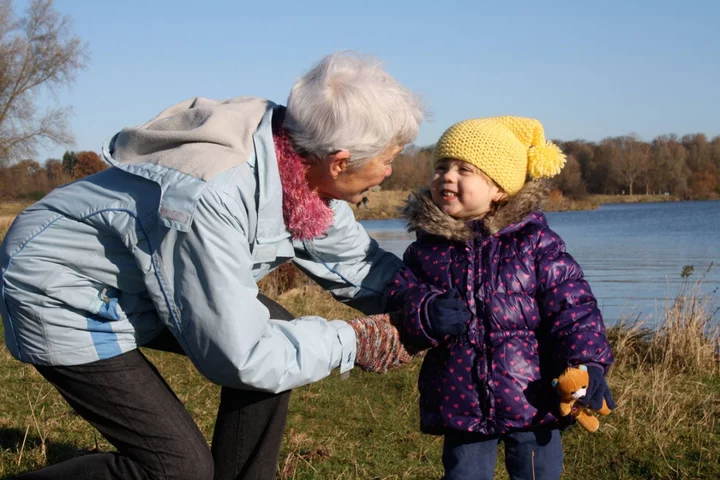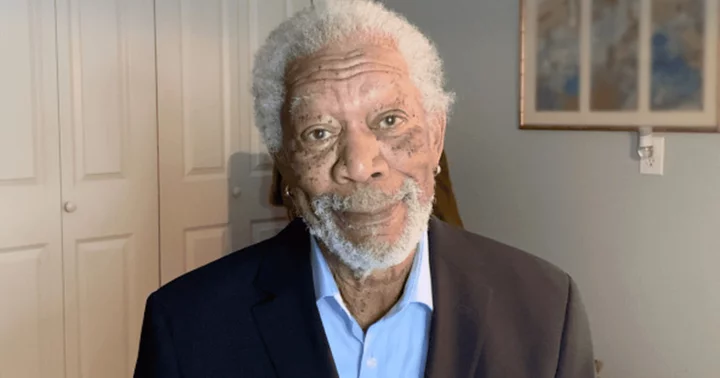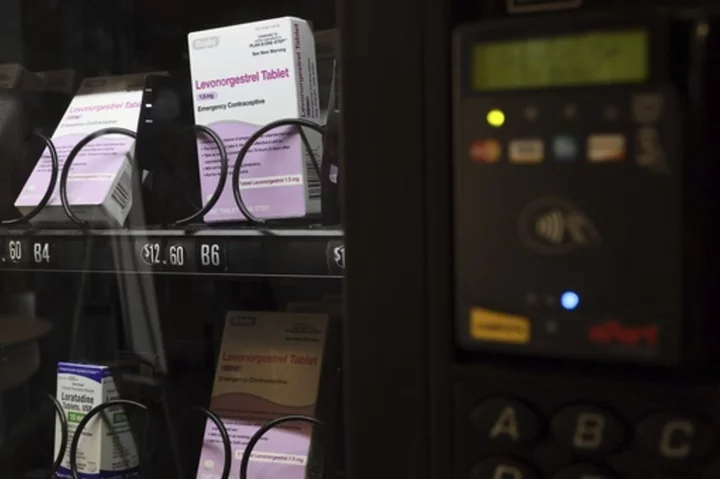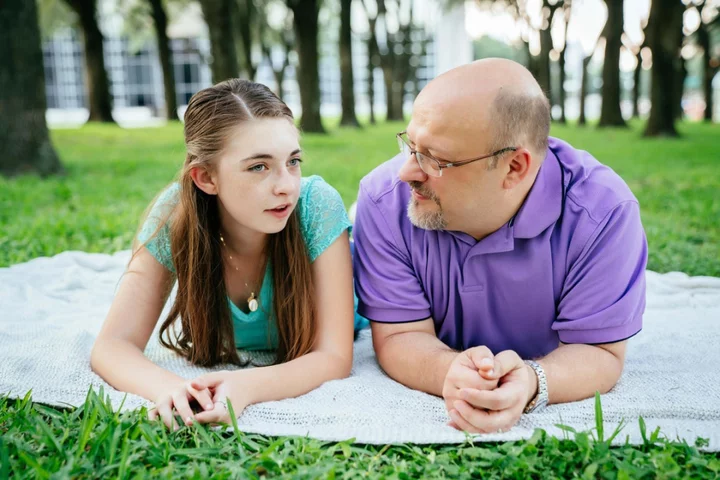Dementia is very hard for adults to understand – so imagine how perplexing it must be for a child. Not only does a close family member like their grandma or grandpa start forgetting things, but dementia – the most common form of which is Alzheimer’s – can mean those affected have problems with planning, decision-making and language, as well as changes in their mood and behaviour. And they’re only going to get worse. But how do you explain all this to a child? “Finding out someone close to you has dementia is difficult for everyone, and we all need time to adjust and come to terms with our feelings,” says Dr Tim Beanland, head of knowledge management at the Alzheimer’s Society. “Children and young people are no different, but it can be harder for them, as they may not properly understand what dementia is, or they might find it harder to cope with their feelings. “One of the most important approaches is to listen to the concerns of the young person or child. It’s very important to try to get a sense for how much they can cope with, and tailor the discussion accordingly.” Here are Beanland’s suggestions for how to explain dementia to a child… 1. Explain what dementia is Make sure you know the facts about dementia, and convey at least some of what you know to your child, in an age-appropriate manner. “Explain as clearly and calmly as possible, at a level that the child can understand,” advises Beanland. “Try to get a sense of how much detail they can cope with.” 2. Be clear and honest Try to be as honest as you can, offering clear explanations and plenty of reassurance, Beanland says. “It’s important to make sure they know they can ask questions any time they need to.” 3. Acknowledge the affected person’s behaviour Talk about the behaviour of the person with dementia, for example if they’re forgetting where they are, or not recognising family members, says Beanland. Make sure your child knows you understand the behaviour may seem strange to them. 4. Listen carefully to what children have to say Try to imagine the situation from your child’s point of view, suggests Beanland. “Think about their relationship with the person with dementia – this will help you find out if they’re worrying about something specific,” he says. 5. Be patient You may need to repeat your explanations on different occasions, depending on the age and level of understanding of the child. 6. Tell the school If your child is at school, it’s often a good idea to let staff know that your relative has dementia, says Beanland. That way, if the child’s behaviour is affected at all by what’s happening with their relative, teachers may realise what’s triggering the behaviour. 7. Remind children you’re still there for them It’s important to reassure children that others are still there for them, says Beanland. “They need to know that, despite all the pressures, they are still loved – however preoccupied or frustrated other people may be sometimes.” He says this can help to provide opportunities for them to talk about any concerns they might have. “Give the child plenty of reassurance and hugs, and don’t be afraid to use humour, if it feels appropriate,” Beanland says. “It can help if you can laugh together.” 8. Get the person with dementia to talk to the child about their diagnosis if possible If the person with dementia has received an early diagnosis, or has a form of dementia that doesn’t initially affect their understanding and communication, they may be able to talk about their diagnosis to a child themselves. “This can potentially be a good way of reducing fear and maintaining a positive relationship,” says Beanland. 9. Let them know you are there Encourage the child to ask any questions they have, and let them know they can always talk to you without being judged. “You could also set aside a regular time to talk or do activities together when they can speak with you alone,” suggests Beanland. 10. Talk about living well with dementia Once you’ve explained as well as you can what dementia is and what’s happening to your loved one, try to be positive about their remaining abilities. “Focus on the things that the person with dementia can still do, as well as those that are becoming more difficult,” Beanland suggests. Read More Charity boss speaks out over ‘traumatic’ encounter with royal aide Ukraine war’s heaviest fight rages in east - follow live How to make your home summer ready Jetting off this summer? Doctors share essential in-flight health tips How do heterosexual celebrities become LGBTQ+ icons?
Dementia is very hard for adults to understand – so imagine how perplexing it must be for a child.
Not only does a close family member like their grandma or grandpa start forgetting things, but dementia – the most common form of which is Alzheimer’s – can mean those affected have problems with planning, decision-making and language, as well as changes in their mood and behaviour.
And they’re only going to get worse. But how do you explain all this to a child?
“Finding out someone close to you has dementia is difficult for everyone, and we all need time to adjust and come to terms with our feelings,” says Dr Tim Beanland, head of knowledge management at the Alzheimer’s Society. “Children and young people are no different, but it can be harder for them, as they may not properly understand what dementia is, or they might find it harder to cope with their feelings.
“One of the most important approaches is to listen to the concerns of the young person or child. It’s very important to try to get a sense for how much they can cope with, and tailor the discussion accordingly.”
Here are Beanland’s suggestions for how to explain dementia to a child…
1. Explain what dementia is
Make sure you know the facts about dementia, and convey at least some of what you know to your child, in an age-appropriate manner. “Explain as clearly and calmly as possible, at a level that the child can understand,” advises Beanland. “Try to get a sense of how much detail they can cope with.”
2. Be clear and honest
Try to be as honest as you can, offering clear explanations and plenty of reassurance, Beanland says. “It’s important to make sure they know they can ask questions any time they need to.”
3. Acknowledge the affected person’s behaviour
Talk about the behaviour of the person with dementia, for example if they’re forgetting where they are, or not recognising family members, says Beanland. Make sure your child knows you understand the behaviour may seem strange to them.
4. Listen carefully to what children have to say
Try to imagine the situation from your child’s point of view, suggests Beanland. “Think about their relationship with the person with dementia – this will help you find out if they’re worrying about something specific,” he says.
5. Be patient
You may need to repeat your explanations on different occasions, depending on the age and level of understanding of the child.
6. Tell the school
If your child is at school, it’s often a good idea to let staff know that your relative has dementia, says Beanland. That way, if the child’s behaviour is affected at all by what’s happening with their relative, teachers may realise what’s triggering the behaviour.
7. Remind children you’re still there for them
It’s important to reassure children that others are still there for them, says Beanland. “They need to know that, despite all the pressures, they are still loved – however preoccupied or frustrated other people may be sometimes.” He says this can help to provide opportunities for them to talk about any concerns they might have. “Give the child plenty of reassurance and hugs, and don’t be afraid to use humour, if it feels appropriate,” Beanland says. “It can help if you can laugh together.”
8. Get the person with dementia to talk to the child about their diagnosis if possible
If the person with dementia has received an early diagnosis, or has a form of dementia that doesn’t initially affect their understanding and communication, they may be able to talk about their diagnosis to a child themselves. “This can potentially be a good way of reducing fear and maintaining a positive relationship,” says Beanland.
9. Let them know you are there
Encourage the child to ask any questions they have, and let them know they can always talk to you without being judged. “You could also set aside a regular time to talk or do activities together when they can speak with you alone,” suggests Beanland.
10. Talk about living well with dementia
Once you’ve explained as well as you can what dementia is and what’s happening to your loved one, try to be positive about their remaining abilities. “Focus on the things that the person with dementia can still do, as well as those that are becoming more difficult,” Beanland suggests.
Read More
Charity boss speaks out over ‘traumatic’ encounter with royal aide
Ukraine war’s heaviest fight rages in east - follow live
How to make your home summer ready
Jetting off this summer? Doctors share essential in-flight health tips
How do heterosexual celebrities become LGBTQ+ icons?









